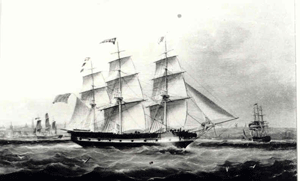On June 3, 1842 a sailing schooner, the Sir Walter Scott, entered the harbour of St. John’s, Newfoundland. On the wharf were Bishop Michael Anthony Fleming and many townspeople excited to welcome three Sisters of Mercy who were to establish the first foundation of the Mercy Order in the “new world.” The three women from Baggot Street had left Kingstown Harbour on May 2 for the difficult and dangerous crossing of the north Atlantic. Who were these three courageous Sisters of Mercy? They were Sisters Ursula Frayne, Rose Lynch and Francis Creedon.
This is part of the story of that foundation and of Sister Francis Creedon who is upheld by the Newfoundland Sisters of Mercy of Newfoundland as founder. 
Reflection on Sister Mary Francis Creedon
Foundress of the Sisters of Mercy of Newfoundland, on the 200th anniversary of her birth
Two hundred years ago this year in County Cork, Ireland, Marianne Creedon, known to us as Sister Francis Creedon, was born. We know little about Marianne’s early life, but we do know that her adult life was one of service and unwavering fidelity in the face of seemingly insurmountable obstacles.
The bishop was determined to find a community of nuns who would be able to respond to these very urgent needs of his people. Hearing of the great work being done by the newly-established Order of Mercy in Ireland and learning that they were not bound by the customary law of enclosure, he saw these sisters as ideally suited to his plans. He undoubtedly shared his hopes and his excitement with Marianne, who must have been moved by the bishop’s zeal as well as by what she saw around her.
In 1839 Marianne left for Dublin to make her novitiate with Catherine McAuley, with the express purpose of establishing the Order of Mercy in Newfoundland. Professed in 1841, she was ready for her mission, but the foundation plans were delayed because of Catherine’s death in November of that year. This delay must have been a disappointment for the newly-professed Sister Mary Francis, but she remained steadfast and continued ministry at Baggot Street until May of 1842.
The pain of being caught in the middle between Bishop Fleming, her friend and Sister Ursula Frayne, the named superior of her community
The conflict in community surrounding the acceptance of Sister Joseph Nugent, her brother-in-law’s sister
The return to Ireland of Sisters Ursula and Rose just six months after their first school opened
The unwillingness of the Baggot Street sisters to send help to the fledgling foundation
The devastation of the Great Fire of 1846
The typhus epidemic of 1847 and the constant call of the sick for help and consolation
The death of Sister Joseph Nugent in June 1847, leaving her to carry on alone
The loneliness, isolation and concerns of the following year when she kept school open, taught music and visited the sick
The death of her friend and mentor, Bishop Fleming in 1850
The cholera epidemic of 1854 which left many children orphaned, and which led to the establishment of the Immaculate Conception Orphanage at Mercy Convent
Her “wearing out” at the age of 43 years
In the midst of all this seeming turmoil and suffering, what made Sister Francis stay? She was urged by many of her friends to give up the mission. Mother Agnes O’Connor, her friend from novitiate days, invited her to join her in New York. Yet she stayed …
What soul-searching went on in her?
How did she perceive God’s action in all of this pain and uncertainty?
What sustained her at these times?
What helps you to remain faithful when all seems confusing, uncertain, hopeless …?
Had Catherine not spoken often and passionately about the comfort of God’s providential care, of the joy of a life centered in God, of the necessity of placing one’s trust in God alone?
In her times of solitude, memories such as these must have surfaced in Sister Francis, bringing her hope and consolation, strengthening her for the incredible journey of faith she was living. Many times as she prayed at Mercy Convent, she must have fingered her beads, reliving the joyful, sorrowful and glorious mysteries of her own life, thanking God for the gift of her call to Mercy, believing that all was in God’s hands, and that the fruit of her labours would come in God’s own time. Her call, her life, her ministry of Mercy is a gift to us, a treasure to be claimed and cherished as we remember and celebrate her on June 3 this year.
What gift is she giving you today?


